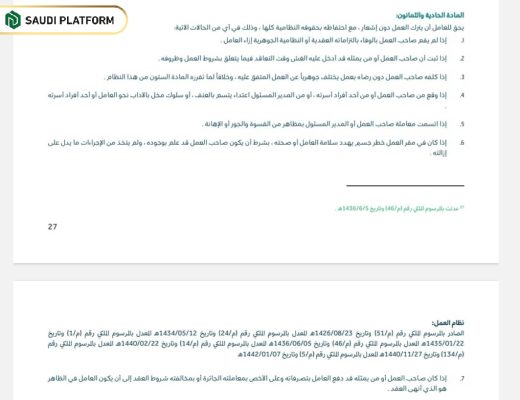
Saudi Labor Law Article 81
The Saudi labor law includes a set of legislation related to regulating the employment process within the Kingdom, managing the process of employing non-Saudi expatriates, providing training and qualification, preserving the rights of workers and employers, and preventing any violations against any party to the work.
Table Of Contents
- 1 Saudi Labor Law Article 81
- 2 Saudi Labor Law Article 81 pdf
- 3 Questions & Answers
- 3.1 How many sections are there in the Saudi Labor Law?
- 3.2 How many articles are there in the Saudi Labor Law?
- 3.3 Does the Saudi Labor Law protect workers residing in the Kingdom?
- 3.4 When was the last labor law issued in Saudi Arabia?
- 3.5 Is it necessary to create an employment contract when working for a private company in Saudi Arabia?
- 3.6 What is the text of Article 60 of the Saudi Labor Law?
Saudi Labor Law Article 81
Article 81 of the Saudi Labor Law stipulates that resignation without a notice period includes the following components:
The worker has the right to leave work without notice while retaining all his statutory rights, in any of the following cases:
- If the employer does not fulfill his fundamental contractual or legal obligations towards the worker.
- If it is proven that the employer or his representative committed fraud at the time of contracting with regard to the terms and conditions of work.
- If the employer assigns him, without his consent, to work that is fundamentally different from the work agreed upon and contrary to what is stipulated in Article Sixty of this law.
- If the employer, a member of his family, or the responsible manager commits a violent assault or immoral behavior towards the worker or a member of his family.
- If the treatment of the employer or the responsible manager is characterized by manifestations of cruelty, unfairness or insult.
- If there is a serious danger in the workplace that threatens the safety or health of the worker, provided that the employer was aware of its existence and did not take any measures to remove it.
- If the employer or his representative has pushed the worker by his actions, especially by treating him unfairly or by violating the terms of the contract, until the worker is ostensibly the one who terminated the contract.

See more: New Labour Law in Saudi Arabia
Saudi Labor Law Article 81 pdf
You can download a file containing Article 81 of the Saudi Labor Law: Resignation without a notice period by accessing the link “from here“, as this article is one of the articles that guarantees the rights of workers who were forced to leave work without a notice period according to the specific cases.
Conclusion
The labor system in Saudi Arabia contains 245 articles, in order to ensure that all work requirements are mentioned and to guarantee the rights of workers in the Kingdom, whether citizens or residents, as well as to guarantee the rights of employers and prevent the occurrence of problems.
Questions & Answers
How many sections are there in the Saudi Labor Law?
The Saudi Labor Law consists of sixteen chapters.
How many articles are there in the Saudi Labor Law?
The Saudi Labor Law consists of 245 articles distributed into sixteen chapters.
Does the Saudi Labor Law protect workers residing in the Kingdom?
Yes, the Saudi Labor Law works to guarantee the rights of all workers and prevent any injustice against them.
When was the last labor law issued in Saudi Arabia?
The last labor law in Saudi Arabia was issued by royal decree in the year 1426 AH.
Is it necessary to create an employment contract when working for a private company in Saudi Arabia?
The employment contract is a guarantee and protection for all parties to the contract. An employment contract must be created when working in a private company to avoid violating the laws and paying fines.
What is the text of Article 60 of the Saudi Labor Law?
Article 60 of the Saudi Labor Law stipulates that a worker may not be assigned work that is fundamentally different from the work agreed upon without his written consent, except in cases of necessity required by unforeseen circumstances and for a period not exceeding 30 days per year.
